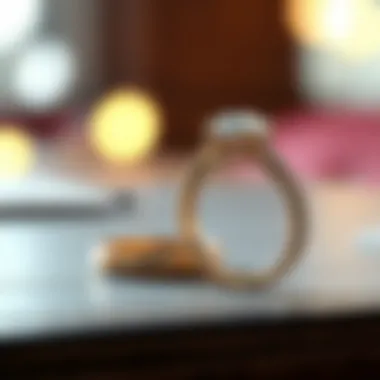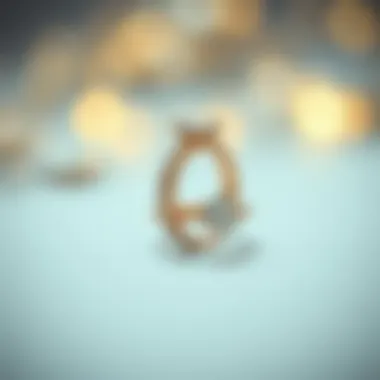Exploring Simulated Wedding Ring Sets: A Complete Guide


Intro
The choice of wedding rings represents a significant moment in many couples' lives, embodying love and commitment. As traditional diamond rings have been the hallmark of this ritual, a shift towards alternatives, specifically simulated wedding ring sets, has become increasingly prevalent in recent years. Simulated wedding rings, made from materials that mimic the appearance of natural gemstones, appeal to diverse sensibilities—encompassing budget-conscious individuals, eco-friendly enthusiasts, and those simply seeking variety.
Understanding these advancements goes beyond mere aesthetics; it involves exploring their significance, materials, styles, and the perceptions surrounding them. Each of these elements plays a vital role in shaping informed choices for couples embarking on their journey towards matrimony. Through this guide, we will embark on a thorough examination of simulated wedding ring sets—an insight not only into their craftsmanship but also how they reflect contemporary values in wedding jewelry.
Whether you're on the lookout for that perfect ring or simply curious about today's jewelry trends, this guide aims to equip you with knowledge that could help navigate the intricate world of wedding jewelry.
In the following sections, we will unpack the latest trends in simulated jewelry, the practical factors to consider when making a choice, and the emerging market dynamics that could influence your decisions.
Prelims to Simulated Wedding Ring Sets
In today’s world, where personal expression reigns supreme, the choice of wedding ring sets signifies more than just a promise of love. As we delve into the realm of simulated wedding rings, we discover their increasing importance among couples looking to balance beauty, affordability, and ethical considerations. The appeal of these sets lies not only in their aesthetic qualities but also in the conscious choices they reflect in a time where sustainability and financial awareness matter.
Defining Simulated Wedding Rings
So, what exactly are simulated wedding rings? These are rings that feature stones meticulously created to mimic the appearance of traditional gemstones, particularly diamonds. Unlike natural stones which are formed over millennia, simulated stones are crafted in controlled environments using advanced technology, yielding options that can mirror the brilliance and sparkle of their natural counterparts.
Each stone offers distinct characteristics, yet all are designed to catch the eye without breaking the bank. Materials such as cubic zirconia, moissanite, and synthetic diamonds are popular choices for these rings, each with their unique advantages. For instance, cubic zirconia is known for its remarkable clarity and affordability, while moissanite boasts superior hardness, making it second only to diamonds in durability.
It's essential to understand these definitions as they establish a foundation for a broader discussion on the value and desirability of simulated wedding ring sets in modern contexts.
The Appeal of Simulated Sets
The charm of simulated wedding ring sets is hard to overlook. Not only do they provide a stunning visual appeal, but they also open doors for couples seeking financial flexibility.
With a variety of styles and settings available, these rings can cater to diverse tastes without compromising on quality or appearance. More and more people are embracing simulated sets—fuelled by a desire to customize their rings to reflect personal stories rather than sticking rigidly to tradition.
Moreover, the ethical considerations tied to gemstone mining have led many to reevaluate their preferences. A growing awareness of conflict diamonds and the environmental impact of mining operations has prompted many couples to opt for simulated alternatives. A ring made with a synthetic stone can often represent a shared commitment to sustainability and social responsibility.
In summary, the rise of simulated wedding ring sets reflects a broader shift towards more personalized, thoughtful choices in wedding jewelry. As couples embark on their journeys together, these rings serve not only as symbols of love but also as reflections of their values and priorities.
Types of Simulated Stones Used
When it comes to wedding rings, the choice of stone plays a crucial role in determining not just the aesthetic appeal of the jewelry, but also its durability and value. In recent years, simulated stones have gained significant traction among couples looking for alternatives to traditional diamonds. Understanding the various types of simulated stones available can empower consumers to make informed decisions that resonate with their preferences and ethical considerations. Whether one prioritizes affordability, environmental sustainability, or aesthetic brilliance, there is a simulated stone to match those criteria. Here, we delve into three popular types: cubic zirconia, moissanite, and synthetic diamonds.
Cubic Zirconia
Cubic zirconia, often abbreviated as CZ, is perhaps the most well-known and widely used simulated stone in the jewelry market. Its affordability and visual similarity to diamonds make it a popular choice for many couples.
- Visual Appeal: CZ has a high refractive index, meaning it can mimic the sparkle of a diamond quite effectively. To the untrained eye, distinguishing CZ from diamonds can be a daunting task.
- Color Options: Available in a spectrum of colors, cubic zirconia allows for unique designs that can reflect individual tastes. This versatility gives it an edge over natural stones, which are typically limited in color options.
- Durability: CZ is rated 8–8.5 on the Mohs scale of mineral hardness, making it resistant to scratches and wear, though not as tough as diamonds or moissanite.
However, it's worth noting that cubic zirconia isn't without drawbacks. Over time, it may tend to lose its brilliance due to wear and tear, leading to potential eye-catching dullness.
Moissanite


Moissanite stands out as a remarkable alternative to diamonds, often celebrated for its exceptional brilliance and fire – attributes that stir up intrigue among fashion lovers and industry professionals alike.
- Superior Brilliance: Moissanite has a refractive index even higher than that of diamonds, which means it exhibits a sparkle that can turn heads. The unique crystal structure allows it to reflect light in an extraordinary manner, producing what some describe as a rainbow effect.
- Durability: Rated at 9.25 on the Mohs scale, moissanite is incredibly durable, making it a practical choice for everyday wear. It's less likely to chip or scratch, which is a significant consideration for wedding rings intended for lifelong use.
- Ethical Sourcing: Unlike traditional diamonds, which have raised concerns about conflict and environmental impact, moissanite is lab-created, ensuring ethically responsible sourcing. This aspect resonates deeply with consumers who prioritize transparency in their purchases.
While moissanite holds strong advantages, it is also typically priced higher than cubic zirconia, making it essential for buyers to evaluate their budget against their preferences.
Synthetic Diamonds
Synthetic diamonds, also referred to as lab-grown or cultured diamonds, have taken the market by storm, presenting an option that closely resembles natural diamonds in both chemical composition and appearance.
- Identical Composition: Both natural and synthetic diamonds share the same chemical structure: carbon. This fact often blurs the lines for buyers who want the diamond experience without the ethical and financial trade-offs associated with mined gems.
- Environmental Impact: As they are created in controlled lab environments, synthetic diamonds typically have a lower ecological footprint compared to their mined counterparts. For environmentally-conscious consumers, this is a compelling reason to opt for synthetic over natural.
- Appreciation Potential: One of the key factors consumers usually consider is value retention. While natural diamonds may retain their value better over the long haul, the market for lab-grown diamonds is expanding, and interest remains strong.
Despite their advantages, some buyers may still favor the tradition and history associated with natural diamonds, leading to ongoing debates about value perception in the market.
"Each of these alternatives presents unique benefits and considerations that resonate differently depending on individual values and aesthetics. Ultimately, when it comes to love and commitment, the stone you choose is a personal reflection of your journey together."
Design Considerations for Simulated Wedding Rings
When delving into the world of simulated wedding rings, appreciating the design elements becomes crucial. Design considerations are not merely about aesthetics; they encompass the style, practicality, and personalized expressions of love this jewelry aims to signify. As couples venture into this unique realm, they often find themselves confronted with an array of design choices that speak volumes about their individualities and values.
Popular Styles and Settings
The selection of styles and settings in simulated wedding rings can be as diverse as the couples who wear them. Generally, the most well-liked styles include:
- Classic Solitaires: A single stone set in a simple band that highlights the brilliance of the simulated stone without any distractions. This timeless style suits traditional tastes.
- Halo Settings: This involves a central gemstone surrounded by smaller stones, creating an ethereal sparkle. The halo effect can give the appearance of a larger stone at a fraction of the cost.
- Three-Stone Rings: Ideally representing the past, present, and future, these rings are a popular choice for those looking to imbue their ring with deeper meaning.
- Vintage or Antique Styles: Many couples gravitate towards intricate designs inspired by eras gone by, offering a unique flair that stands out.
Choosing a setting also plays a significant role. For instance, a four-prong setting provides maximum light exposure to the stone, enhancing its visual appeal. On the other hand, a tension setting creates an illusion of floating stones, lending a modern touch. Each option reflects not just a preference for beauty, but also a bit of the couple’s character.
Customization Options
Customization opens a new world of possibilities when it comes to choosing a simulated wedding ring set. Couples should consider the following options:
- Metal Choices: Ranging from white gold, yellow gold, rose gold, to platinum. Each metal comes with its distinct ambiance and can affect the perceived color of the simulated stone. For example, a rose gold setting can emit warmth, enhancing the soft hues of a moissanite or cubic zirconia.
- Engravings: Personalized messages or dates can add sentimental value, making the ring uniquely theirs. Whether it’s a name, a special date, or even a phrase, these engravings tell a story that’s deeply personal.
- Mixing Stones: Pairing different simulated stones can yield stunning results. A band with alternating cubic zirconia and colored sapphire, for instance, adds uniqueness to the traditional ring design, resonating with the owner’s personal style.
Ultimately, taking the time to explore design options not only helps couples find the perfect ring but also reinforces the meaning behind it. In a world filled with choices, simulating what speaks to the heart can result in a decision that is as authentic as love itself.
"A ring is a circle – it has no end. This symbolizes love, unbroken and everlasting."
Whether planning a wedding or simply seeking a unique expression of commitment, focusing on these design elements will pave the way for a lasting impression.
The Benefits of Choosing Simulated Rings
When it comes to wedding jewelry, traditional diamonds have long held the crown as the supreme choice. Yet, the tide is shifting. Simulated wedding rings are gaining traction, not just as alternatives, but as smart choices with multifaceted benefits. Understanding these advantages is key for anyone contemplating their wedding jewelry options.
Cost-effectiveness


One significant allure of simulated ring sets is their price tag. Authentic diamonds tend to come with financial burdens, often leading couples to tighten their budgeting elsewhere. However, simulated stones can offer that coveted sparkle without leaving the bank account in tatters.
Take, for instance, Moissanite. This gemstone can sparkle just as bright—if not brighter—than traditional diamonds, all while setting you back by a fraction of the cost. According to many retailers, shoppers can find exquisite simulated rings for under [specific amount], offering a more reasonable alternative to similar-looking diamond rings.
So, whether you're planning a lavish wedding or are simply being budget-conscious, opting for a simulated wedding ring makes a lot of sense. You can allocate savings for the honeymoon or even the down payment on your first home, allowing for greater choices down the road.
Ethical Considerations
It's undeniable that ethical shopping has entered mainstream conversations, especially in the jewelry industry. Traditional diamond mining has been linked to numerous issues, including environmental degradation and human rights violations. By choosing simulated rings, couples can feel confident in their purchase. They can avoid the contentious realm of
Consumer Perceptions and Market Trends
The topic of consumer perceptions and market trends regarding simulated wedding rings is crucial in understanding the broader landscape of wedding jewelry choices today. With the rise in awareness surrounding environmental issues and ethical considerations, many couples are reevaluating their choices. Simulated wedding ring sets have gained traction as they offer an appealing alternative to traditional diamond rings.
Consumer attitudes towards simulated rings have undergone a notable transformation in the past years. It's no longer a matter of merely replicating the aesthetics of natural diamonds; it's also about the narrative that surrounds these rings. Couples are becoming more inclined to appreciate the significance behind the materials rather than simply the status they might convey. This shift is influenced by various factors, including cultural narratives, awareness campaigns, and personal values relating to sustainability.
Traditionally, a diamond was seen as the only worthy stone for an engagement ring. Today, many consumers recognize that simulated options can offer the same visual charm without the hefty price tag or the ethical baggage associated with mined diamonds. Notable benefits of choosing simulated rings include:
- Affordability: It's clear that couples can save a substantial sum by opting for simulated stones instead of natural ones. It's a win-win situation; you get an exquisite ring without breaking the bank.
- Ethical Considerations: There's a growing acknowledgment of the unethical practices in diamond mining, which include labor exploitation and environmental destruction. Consumers are increasingly drawn to the idea that their ring choice reflects their values.
- Variety of Choices: Simulated rings also boast a diverse selection of styles, colors, and designs, giving couples the freedom to choose something that is truly unique to them.
Changing Attitudes Towards Simulated Rings
As more people engage in dialogue about sustainability and responsible purchasing, there has been a marked change in attitudes towards simulated wedding rings. The perception of these rings has evolved from being seen as inferior or a compromise to being embraced as a smart, modern choice. Many couples today prioritize craftsmanship and emotional significance over traditional notions of luxury.
Social media plays a crucial role in reshaping these attitudes. Platforms like Instagram and Pinterest showcase stunning images of simulated rings, emphasizing aesthetics over legacy. The hashtag #simulatedrings often features posts from couples who proudly share the story behind their choice. This grassroots movement contributes to a widespread acceptance of simulated rings as a legitimate and desirable option.
"The beauty of a wedding ring lies not in the stone, but in the love it represents."
Popularity Among Millennials
It’s no secret that millennials are redefining the wedding industry. They are especially receptive to the ethos of sustainability and conscious consumerism. As they enter the phase of life where engagement rings become relevant, the simulated market has seen a surge in popularity among this demographic.
Millennials are often characterized as valuing experiences over material possessions. This carries over into their wedding ring choices, making simulated rings an attractive option. There is a growing perception that spending less on a wedding ring could allow for more meaningful experiences, such as travel or homeownership.
- Influencer Culture: Many influencers openly discuss their choice of simulated rings, further normalizing this trend. This visibility helps to shift the narrative that only real diamonds have significance. Millennials are buying in and often sharing their own stories, creating a community that values authenticity over rarity.
- Market Adaptability: Brands targeting millennials have also adapted their marketing strategies. Rather than emphasizing the stark beauty and rarity of diamonds, they focus on the stories behind their simulated products, capitalizing on the emotional connections of buyers.
Navigating the Buying Process
Navigating the buying process for simulated wedding ring sets can feel like wandering through a maze. It’s essential to approach this task with not just excitement, but a healthy dose of mindfulness. Given the range of options and styles available, understanding the intricacies of making a purchase is crucial. When couples embark on this journey, they should prioritize informed decision-making to ensure a purchase that aligns with their values and expectations.
The significance of thoroughly navigating this process cannot be overstated. Simulated wedding rings can be both beautiful and budget-friendly, offering individuals a versatile alternative to traditional diamonds. However, without the right knowledge, potential buyers risk encountering pitfalls that could lead to dissatisfaction. Knowing where to look, what to look for, and what to avoid can empower consumers, ensuring they make a choice that is both gratifying and enduring.
Where to Purchase Simulated Wedding Ring Sets
When it comes to finding that perfect ring, the marketplace has expanded significantly. You can consider multiple purchasing avenues:


- Online Retailers: Websites like James Allen or Brilliant Earth specialize in simulated rings and offer extensive customization options. They often provide detailed product images and easy return policies.
- Jewelry Stores: Many local jewelers are now adding simulated options to their showcases. This can allow for an in-person experience where you can try on various styles.
- Etsy: If you’re interested in unique or handcrafted designs, Etsy can be a treasure trove. Many artisans offer customized simulated rings, allowing for a distinctive touch.
Finding the right venue might also hinge on your specific preferences and budget. Both online and brick-and-mortar options come with unique advantages, whether it’s the convenience of shopping from home or the tactile experience of trying on a ring before committing.
Red Flags to Consider
Buying a simulated wedding ring set isn’t just about picking something pretty—it's also about identifying and avoiding potential issues. Here’s what to keep an eye out for:
- Unrealistic Prices: If a deal seems too good to be true, it probably is. Cross-check prices with reputable sources to gauge what’s reasonable for similar products.
- Lack of Certification: Just like natural diamonds, quality simulated stones can have certifications. Ensure vendors provide authenticity details for the stones they sell.
- Poor Return Policies: If a seller doesn’t offer a reasonable return or exchange policy, that’s a huge red flag. You want the option to return if the product isn’t what you expected.
- Customer Reviews and Complaints: Look up feedback from previous customers. This can give you insight into the retailer’s reputation and the quality of their product.
"In a world of glitzy options, knowledge is your best accessory."
By being vigilant during your journey, you increase your chances of walking away with a piece of jewelry that you'll cherish for years to come.
Case Studies: Simulated Wedding Ring Users
Understanding real-life experiences with simulated wedding rings provides invaluable insights into their acceptance and usage in today's society. These case studies serve as a lens through which potential buyers can assess not only the aesthetic appeal but also the emotional resonance of choosing simulated stones for such an important life event. By exploring different couples' stories and perspectives, readers can garner a well-rounded understanding of the practicality and sentimentality tied to these jewelry choices.
Insights from Real Couples
Many couples have taken the plunge into the world of simulated wedding rings, often sharing substantial and life-affirming narratives regarding their choices. For instance, Emma and Jack, a couple from Wisconsin, opted for a moissanite set after grappling with their budget constraints. They wanted a ring that looked exquisite without breaking the bank. "We wanted something that would shine just as bright as our love," Emma mentioned during a conversation. Their choice reflected not just a monetary decision but also a commitment to sustainability—moissanite's lower environmental impact resonated with their values.
Another couple, Sarah and Mike from New York City, considered synthetic diamonds. Sarah found herself curious about the difference between lab-created gems and traditional stones. They both eventually chose a stunning lab-grown diamond for its clarity and ethical origins. "We wanted our love to shine without the guilt of harmful mining practices behind it," Sarah articulated. Their story exemplifies how many modern couples prioritize ethics alongside aesthetics, indicating an evolving trend towards more conscientious choices in wedding jewelry.
Expert Opinions
Experts in the jewelry industry view the rise in popularity of simulated wedding rings as a reflection of shifting societal values. Dr. Lucy Bennett, a gemologist, states, "Simulated stones provide an accessible way for couples to express their love creatively and ethically. They are now more than just replacements; they symbolize a forward-thinking choice in an era where sustainability is paramount." Her insights emphasize how professionals perceive the merging of art and ethics in the realm of wedding jewelry.
Moreover, according to a recent survey from the Jewelry Consumer Guide, nearly 65% of engaged couples expressed an interest in exploring simulated options due to their affordability and unique beauty. The trend is well-supported by the industry's enthusiasm for innovative materials and customization opportunities.
"Today's couples are not just looking for a ring; they seek a story and a conscience behind that choice."
These expert opinions, coupled with genuine testimonials from couples who made the choice to go simulated, establish a clear dialogue—one that invites potential buyers to rethink traditional notions of "real" in the context of love and commitment.
Finale
In concluding our exploration of simulated wedding ring sets, it is essential to grasp not just the practical aspects, but also the underlying motives and sentiments driving their acceptance. This section weaves together significant elements discussed throughout the article, all while emphasizing the profound benefits provided by simulated options.
Summarizing the Value of Simulated Wedding Rings
Simulated wedding rings offer an intriguing alternative to traditional diamond sets, with their variety of styles and appealing price points. Many couples find that these rings align perfectly with their values and needs. Let's consider a few core values, shall we?
- Affordability: Simulated rings, like cubic zirconia or moissanite, are typically more wallet-friendly than their diamond counterparts, allowing couples to invest in other areas of their lives, be it their honeymoon or home.
- Ethical Resonance: Increasingly, people are concerned about the origins of diamonds and the potential ethical dilemmas surrounding their sourcing. Opting for a simulated ring means one can steer clear of conflict issues, all while still showcasing a stunning piece of jewelry.
- Versatility: Whether someone adheres to traditional styles or favors contemporary design, simulated rings cater to a wide array of tastes. There's something out there for every personality.
- Innovation and Engineering: The advancement in techniques for crafting simulated stones has reached impressive heights. Moissanite, for instance, exhibits a sparkle that can rival diamonds, often making many second-guess their choices. One can truly find beauty in science.
As the conversation around sustainability and personal values continues to evolve, it’s clear that simulated rings not only meet the practical facets of wedding jewelry but also resonate with the emotional dimensions that accompany such a significant commitment.
Future of Simulated Wedding Jewelry
Looking ahead, one can envision a vibrant landscape for simulated wedding jewelry, fueled by both technological advancements and shifting cultural attitudes. Here’s what stands out in the horizon:
- Rising Acceptance: As societal norms continue to shift, the once-stigmatized notion of wearing simulated rings is rapidly changing. Over time, preferences may lean more toward uniqueness and personal values than just brand prestige.
- Technological Innovations: We are on the cusp of more advanced simulations that not only look exquisite but are also scientifically designed to last longer and withstand daily wear. This might encompass lesser-known properties about durability and maintenance being prioritized in future designs.
- Environmental Awareness: As awareness of environmental impact increases, simulated stones will likely gain ground due to their lower ecological footprint compared to mined diamonds. More brands may prioritize sustainable practices in their production processes as a response to consumer demand.
- Collaboration with Designers: Expect to see partnerships between major fashion designers and simulated stone manufacturers, elevating the artistry and design of simulated jewelry to new levels. Coupled with marketing strategies, they will likely appeal to a broader audience, showcasing the true potential of simulated jewelry.
In summary, the future seems bright for simulated wedding rings as they continue to attract those who value beauty, ethics, and economic sensibility. Knowing the nuances behind these choices enables couples not just to make informed decisions, but also helps infuse their personalities into symbols of love that endure.







